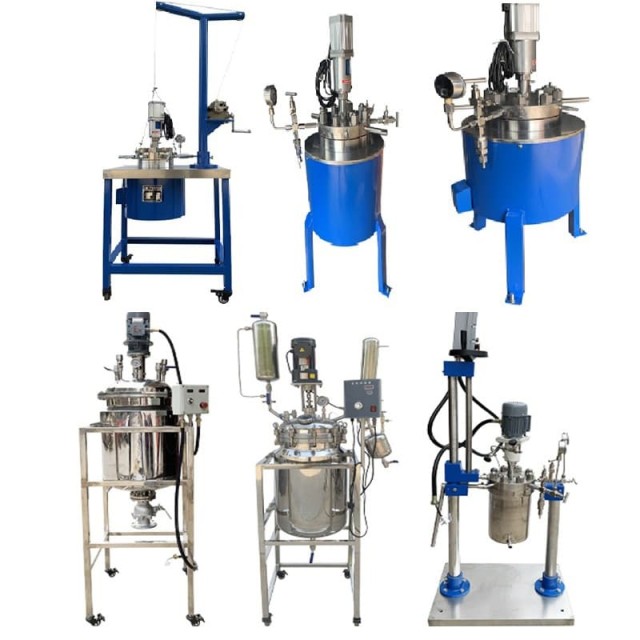
High Pressure Reactor
Stainless High Pressure Autoclave Reactor Laboratory Pressure Reactor
Item Number : RE-1H
Price varies based on specs and customizations
- Reactor volume
- 1-50 L
- Working pressure
- ≤22 Mpa
- Temperature range
- ≤350 ℃
- Stirring speed
- 10-800 RPM
Shipping:
Contact us to get shipping details Enjoy On-time Dispatch Guarantee.
Why Choose Us
Easy ordering process, quality products, and dedicated support for your business success.
Applications
Stainless high pressure reactor can be either single layer with direct heating, or double layers by jacket indirect heating,it can work under both vacuum negative pressure and positive high pressure conditions. Agitating function can apply different types drive motor, speed adjustable and high torque force.Lifting function can lift the vessel cap with certain height, which will help the material discharging. Heating can be programmed direct heating or use separate heating liquids for the jacket heating.
Reactor material can be 304 or 316L stainless steel, which working temperature can be up to 3500C, working pressure can be 22Mpa. To avoid material reacting with vessel, PTFE liner can be placed inside the vessel, keep the reacting safe and clean.
Detail & Parts
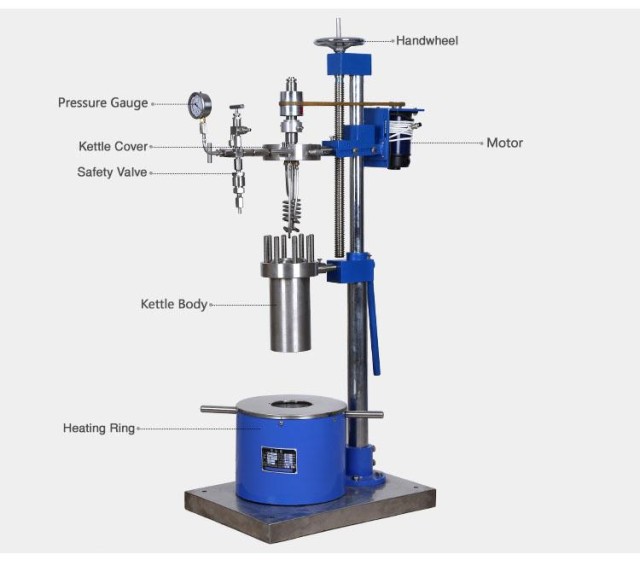 |
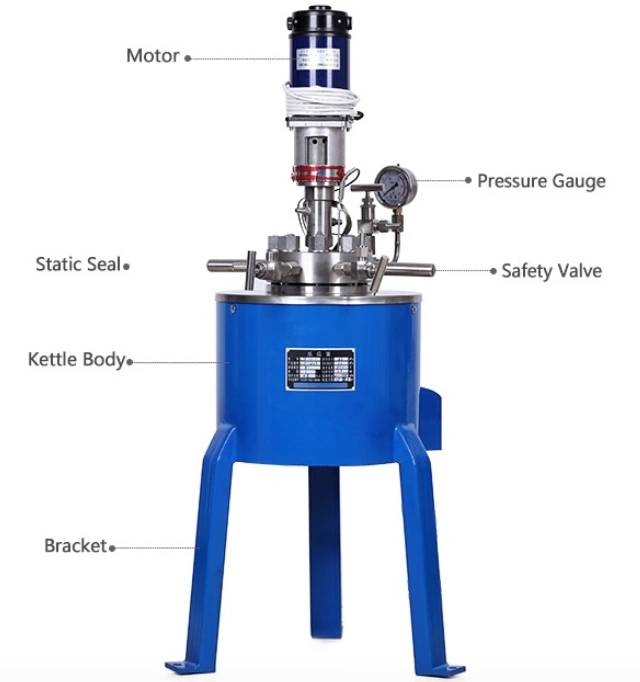 |
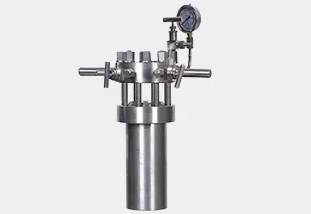 |
Static Seal-No Leakage | Reaction vessel stationary ring and stationary ring base create the perfect seal with no need for o-rings, according to their structural features, contact stress increased with increasing working pressure, sealing performance is better under the high pressure. |
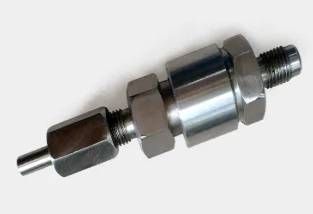 |
Safety Valve-Safe and Sellable | The reaction kettle equipped with safety valve, that adopted blasting diaphragm, blasting numerical error is small, instantly exhaust gas fast, safe and reliable. Each valve adopts needle valve, reciprocating closed form, seal is reliable and durable. All safety valves with resonable installation and releasing unblocked. |
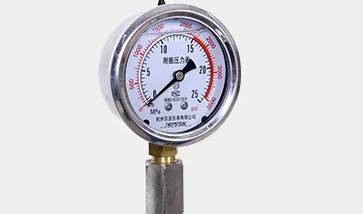 |
Pressure Gauges-Seisnic Stability | Seismic pressure gauges for the environment places severe vibration, the pulse of media tolerance, and the impact of a sudden unloading, gauges clea instructions and stability, with good vibration resistance. |
Features
- Different lifting method is available to meet different reaction processing requirement
- Heating process can be either direct heating the vessel or jacket liquids heating
- PID high temperature control accuracy, heating process can be programmed
- PTFE liner can be made to keep the reaction clean and safe
Technical specifications
| Model | KRS-1 | KRS-2 | KRS-3 | KRS-5 | KRS-10 | KRS-30 |
| Reactor volume | 1L | 2L | 3L | 5L | 10-20L | 30-50L |
| Working pressure | ≤22Mpa | |||||
| Temperature range | ≤350℃ | |||||
| Heating method | Electric heating | |||||
| Heating power | 2Kw | 2Kw | 2.5Kw | 4Kw | 6Kw | 9Kw |
| Stirring power | 80W | 123W | 185W | 270W | ||
| Stirring speed | 10-800RPM | 10-500RPM | ||||
| Controller | PID temperature and speed control with digital display | |||||
| Reactor material | SS304/316L | |||||
| Lifting method | Manual/electric | |||||
| Liner material | Optional PTFE liner | |||||
| Jacket | Optional double layer jacket | |||||
Warnings
Operator safety is the top important issue! Please operate the equipment with cautions. Working with inflammable& explosive or toxic gases is very dangerous, operators must take all necessary precautions before starting the equipment. Working with positive pressure inside the reactors or chambers is dangerous, operator must fellow the safety procedures strictly. Extra caution must also be taken when operating with air-reactive materials, especially under vacuum. A leak can draw air into the apparatus and cause a violent reaction to occur.
Designed for You
KinTek provide deep custom made service and equipment to worldwide customers, our specialized teamwork and rich experienced engineers are capable to undertake the custom tailoring hardware and software equipment requirements, and help our customer to build up the exclusive and personalized equipment and solution!
Would you please drop your ideas to us, our engineers are ready for you now!
Trusted by Industry Leaders

FAQ
What Is A High Pressure Reactor?
What Is An Autoclave Sterilizer?
What Causes An Increase In Pressure Within A High-pressure Reactor?
Increasing pressure inside a pressure reactor can be achieved through various means. One common method is by heating a sealed pressure vessel, where temperature and pressure increase proportionately, impacting reaction kinetics. Alternatively, the reaction occurring inside the vessel can induce pressure, and agitation can accelerate this process.
In situations where heating is unsuitable or insufficient pressure is generated, manual pressurization is possible with a compressed gas source, such as a compressor or a pre-compressed canister of inert gas.
Pressure reactors utilize pressure relief valves to safely regulate and maintain pressure, emphasizing their reliable and safe operation.
How Does An Autoclave Sterilizer Work?
How Does A Pressure Reactor Work?
What Are The Advantages Of Using Autoclave Sterilizers?
What Safety Precautions Should Be Taken When Using Autoclave Sterilizers?
Can All Materials And Items Be Sterilized Using Autoclave Sterilizers?
Are There Different Types Of Autoclave Sterilizers Available?
4.8 / 5
The reactor is constructed with high-quality materials, ensuring longevity in demanding environments.
4.7 / 5
The pressure reactor's temperature control system is precise, allowing for accurate and consistent reactions.
4.9 / 5
The supplier's customer service is exceptional; they promptly addressed my inquiries and resolved any issues.
4.6 / 5
The reactor's compact design saves valuable laboratory space without compromising performance.
4.8 / 5
The reactor's versatility is impressive; it accommodates a wide range of reactions under varying pressure and temperature conditions.
4.7 / 5
The reactor's safety features, including pressure relief valves and temperature sensors, provide peace of mind during operation.
4.9 / 5
The reactor's modular design allows for easy customization and integration with other laboratory equipment.
4.6 / 5
The reactor's construction using premium stainless steel ensures corrosion resistance and extended lifespan.
4.8 / 5
The reactor's user-friendly interface simplifies operation and minimizes training time for laboratory personnel.
4.7 / 5
The reactor's ability to handle high pressures and temperatures makes it suitable for a variety of demanding chemical reactions.
4.9 / 5
The reactor's efficient stirring system ensures uniform mixing of reactants, improving reaction yields and reducing process times.
4.6 / 5
The reactor's rapid delivery and installation minimized downtime in our laboratory, allowing us to resume experiments quickly.
4.8 / 5
The reactor's cost-effectiveness makes it an excellent investment for laboratories operating on tight budgets.
4.7 / 5
The reactor's durability and low maintenance requirements make it a reliable workhorse in our laboratory.
4.9 / 5
The reactor's advanced technology enables precise control and monitoring of reaction parameters, enhancing the accuracy and reproducibility of experiments.
4.6 / 5
The reactor's versatility allows us to perform a wide range of experiments, making it an indispensable tool in our laboratory.
4.8 / 5
The reactor's exceptional quality and performance make it worth every penny, providing excellent value for money.
4.7 / 5
The reactor's user-friendly design and intuitive interface make it easy to operate, even for researchers with limited experience.
4.9 / 5
The reactor's ability to withstand harsh reaction conditions makes it a valuable asset in our laboratory, enabling us to explore new and innovative chemistries.
REQUEST A QUOTE
Our professional team will reply to you within one business day. Please feel free to contact us!
Related Products

High Pressure Laboratory Autoclave Reactor for Hydrothermal Synthesis
Discover the applications of Hydrothermal Synthesis Reactor - a small, corrosion-resistant reactor for chemical labs. Achieve rapid digestion of insoluble substances in a safe and reliable way. Learn more now.

Mini SS High Pressure Autoclave Reactor for Laboratory Use
Mini SS High Pressure Reactor - Ideal for medicine, chemical, and scientific research industries. Programmed heating temp and stirring speed, up to 22Mpa pressure.

Customizable High Pressure Reactors for Advanced Scientific and Industrial Applications
This laboratory-scale high-pressure reactor is a high-performance autoclave engineered for precision and safety in demanding research and development environments.

Laboratory High Pressure Steam Sterilizer Vertical Autoclave for Lab Department
Vertical pressure steam sterilizer is a kind of sterilization equipment with automatic control, which is composed of heating system, microcomputer control system and overheating and overpressure protection system.

Laboratory High Pressure Horizontal Autoclave Steam Sterilizer for Lab Use
The horizontal autoclave steam sterilizer adopts the gravity displacement method to remove the cold air in the inner chamber, so that the inner steam and cold air content is less, and the sterilization is more reliable.

Desktop Fast High Pressure Laboratory Autoclave Sterilizer 16L 24L for Lab Use
The desktop fast steam sterilizer is a compact and reliable device used for rapid sterilization of medical, pharmaceutical, and research items.

Portable High Pressure Laboratory Autoclave Steam Sterilizer for Lab Use
Portable autoclave sterilization pressure is a device that uses pressure saturated steam to quickly and effectively sterilize items.

Laboratory Sterilizer Lab Autoclave Vertical Pressure Steam Sterilizer for Liquid Crystal Display Automatic Type
Liquid crystal display automatic vertical sterilizer is a safe, reliable and automatic control sterilization equipment, which is composed of heating system, microcomputer control system and overheating and overvoltage protection system.

Laboratory Sterilizer Lab Autoclave Pulsating Vacuum Desktop Steam Sterilizer
The pulsating vacuum desktop steam sterilizer is a compact and reliable device used for rapid sterilization of medical, pharmaceutical, and research items.

Laboratory High Pressure Vacuum Tube Furnace
KT-PTF High Pressure Tube Furnace: Compact split tube furnace with strong positive pressure resistance. Working temp up to 1100°C and pressure up to 15Mpa. Also works under controller atmosphere or high vacuum.

Laboratory Horizontal Autoclave Steam Sterilizer Lab Microcomputer Sterilizer
The horizontal autoclave steam sterilizer adopts the method of gravity displacement to remove the cold air in the inner chamber, so that the content of steam cold air in the inner chamber is less, and the sterilization is more reliable.

Laboratory Sterilizer Lab Autoclave Herbal Powder Sterilization Machine for Plant
The herbal powder sterilization autoclave machine for Chinese medicine uses saturated steam for effective sterilization. It utilizes the heat and penetrative properties of steam, achieves sterilization after heat preservation, and maintains a good drying effect with a dedicated drying system.

Laboratory Sterilizer Lab Autoclave Pulse Vacuum Lifting Sterilizer
The pulse vacuum lifting sterilizer is a state-of-the-art equipment for efficient and precise sterilization. It uses pulsating vacuum technology, customizable cycles, and a user-friendly design for easy operation and safety.

Portable Digital Display Automatic Laboratory Sterilizer Lab Autoclave for Sterilization Pressure
Portable autoclave sterilization pressure is a device that uses pressure saturated steam to quickly and effectively sterilize items.

Anti-Cracking Press Mold for Lab Use
The anti-cracking press mold is a specialized equipment designed for molding various shapes and sizes of film using high pressure and electric heating.

Desktop Fast Laboratory Autoclave Sterilizer 35L 50L 90L for Lab Use
The desktop fast steam sterilizer is a compact and reliable device used for rapid sterilization of medical, pharmaceutical, and research items. It efficiently sterilizes surgical instruments, glassware, medicines, and resistant materials, making it suitable for various applications.

Desktop Fast Laboratory Autoclave Sterilizer 20L 24L for Lab Use
The desktop fast steam sterilizer is a compact and reliable device used for rapid sterilization of medical, pharmaceutical, and research items.
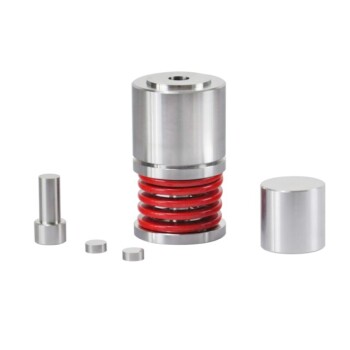
Round Bidirectional Press Mold for Lab
The round bidirectional press mold is a specialized tool used in high-pressure molding processes, particularly for creating intricate shapes from metal powders.

Warm Isostatic Press WIP Workstation 300Mpa for High Pressure Applications
Discover Warm Isostatic Pressing (WIP) - A cutting-edge technology that enables uniform pressure to shape and press powdered products at a precise temperature. Ideal for complex parts and components in manufacturing.
Related Articles

Enhancing Safety in Your Laboratory: A Comprehensive Guide to Pressure Reactor Safety
Laboratory safety isn't just about you. Improper preparation and mishandling can cause potential hazards that could be disastrous if left unchecked. It is crucial to take the time to carefully prepare your pressure reactor and lab safety equipment, as even minor problems can escalate quickly when working under pressure.

10 Essential Safety Steps for Pressure Reactor Use in Laboratories
Safety is paramount when conducting chemical reactions under pressurized conditions. It is important to carefully prepare pressure reactors and laboratory safety equipment to prevent potential hazards that, if not controlled, can have catastrophic consequences. In order to ensure the safety of using a pressure reactor, it is important to understand the specifications of the reactor. Become familiar with the chemistry of the reactor material and make sure it is chemically resistant enough to withstand the substances used in the reaction.

High Pressure Tube Furnace: Applications, Safety, and Maintenance
Explore the advanced applications, safety measures, and maintenance tips for high pressure tube furnaces. Learn how these furnaces are used in various high-temperature processes and ensure optimal performance and safety.

Comprehensive Guide to Rotating Disk Electrode (RDE) in Electrochemical Studies
Explore the detailed workings, applications, and significance of Rotating Disk Electrodes (RDE) in electrochemical research. Discover how RDEs are used in fuel cells, catalyst development, and more.

Laboratory Safety: High Pressure Equipment and Reactors
This article discusses safety measures and precautions for using high pressure equipment and reactors in laboratories, including case studies and detailed usage instructions.

Basic Laboratory Reaction Equipment
Overview of essential lab equipment for chemical reactions under various conditions.

Understanding Isostatic Pressing: Process, Benefits, Limitations, and Applications
Isostatic pressing is a manufacturing process that offers numerous benefits and applications in various industries. It involves subjecting a material to equal pressure from all directions to achieve uniform density and shape. This method is particularly advantageous compared to other production techniques.

Laboratory Jacketed Vessels
Overview of jacketed vessels, their types, and applications in various industries.

Laboratory Safety: Safe Use of High Voltage Equipment
Guidelines for the safe operation of high-pressure equipment in laboratories, including reactors, hydrothermal reactors, autoclaves, and gas cylinders.

Hazards and Safety Precautions of Laboratory Pressure Vessels
An overview of the dangers and safety measures for pressure vessels in laboratory settings.

Essential Tips for Conducting Organic Synthesis Reactions
Guidelines for selecting apparatus, solvents, dosing sequences, quenching, and post-processing in organic synthesis.

Polytetrafluoroethylene (PTFE): How low friction coefficient promotes industrial progress
Explore the unique advantages of polytetrafluoroethylene (PTFE)'s low coefficient of friction and analyze how it promotes progress and innovation in industrial technology in terms of reducing wear and improving equipment efficiency.